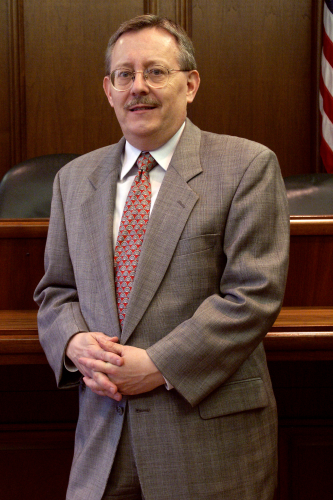Mar 13, 2014
DePaul taps Bruce Ottley as interim law dean
DePaul taps Bruce Ottley as interim law dean
CHICAGO — Bruce Ottley has been appointed interim dean of the College of Law at DePaul University, effective June 1. Ottley is a professor in the college, where he teaches courses in civil procedure, torts, and remedies and products liability.
He previously served as associate dean in the college for a total of nine years, most recently from 1996 to 2000, and as acting dean for a brief period in 2006. In addition to teaching, Ottley is director of the DePaul University-University College Dublin Cooperative Program and co-director of the International Aviation Law Institute. An esteemed expert on tort law, Ottley also conducts seminars for Illinois judges through the Administrative Office of the Illinois Courts.
Prior to joining DePaul’s College of Law in 1978, Ottley practiced law in Papua New Guinea, where he served for a year as a court magistrate of the National Capitol District Court. He also taught law for five years at the University of Papua New Guinea. Ottley is a fellow of the American Anthropological Association and travels to the South Pacific islands, Australia and New Zealand to conduct research.
In addition of journal articles, Ottley is co-author of several books, including, “Understanding Products Liability Law,” “Illinois Tort Law” and “Arson Law and Prosecution.”
He has a Master of Laws from Columbia University, a Juris Doctor and master’s degree from the University of Iowa, and a bachelor’s degree from the University of Missouri-Kansas City.
“Bruce’s distinguished career as a lawyer, professor and university administrator make him well suited to serve as interim dean for DePaul’s College of Law,” said Patricia O’Donoghue, interim provost. “His colleagues demonstrate great administration and respect for his skills as a leader and scholar. I am confident he will successfully guide the college during this time of transition.”
Ottley will replace Gregory Mark, who is stepping down at the end of the academic year to begin a one-year leave of absence to pursue other scholarly and professional opportunities. Mark, a legal historian, has been dean since July 2011. He is expected to return in fall 2015 as a faculty member.
DePaul plans to soon launch a national search for a permanent dean.
DePaul University’s College of Law has helped set the standard for legal education in America since its establishment in 1912. Its rich history of quality education, access and diversity has long set it apart. DePaul was among the first law schools in Illinois to admit historically excluded groups such as female and Jewish students. It also was among the first to introduce such educational innovations as the study of negotiation techniques and courses in international criminal law and in pretrial skills. The law faculty consists of 60 full-time educators — all seasoned attorneys who also are leading scholars; international affairs experts; and accomplished corporate, civil and public interest lawyers.
DePaul law graduates — more than 14,500 since the school’s inception — are highly skilled, committed and vigorous leaders of the bar, bench and business. They include managing partners of dozens of major law firms and CEOs and general counsel of a number of well-known national and international corporations. Alumni also include numerous state and federal judges; many municipal, county and state leaders; and two generations of Chicago mayors.
This February, DePaul’s College of Law was ranked first on the law school list for the largest number of graduates recognized by Illinois Super Lawyers in 2014. This was the fifth consecutive year that DePaul has topped the list. The new edition of Illinois Super Lawyers magazine included 320 DePaul law graduates, with 13 recognized in the top 100 and one in the top 10. Only 5 percent of the state’s lawyers annually are selected for inclusion.
The college continues to create new programs and initiatives in response to the shifting landscape of legal education and the changing needs of the profession. Such initiatives include the Third Year in Practice program, which offers Juris Doctor students the opportunity to complete general law school course requirements in two years and spend the third year of law school in practice. The college also is in the final stages of preparing a new three-year Juris Doctor/Master of Laws as well as other degree programs that will offer students opportunities to better prepare for careers in a particular field. More at http://www.law.depaul.edu.
###

Professor Bruce Ottley has been appointed interim dean of the College of Law at DePaul University, effective June 1.
